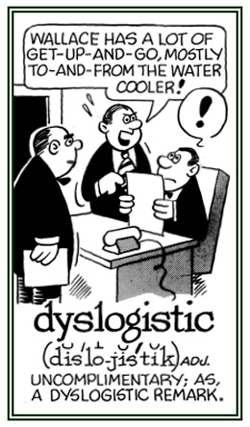dys-
(Greek: bad, harsh, wrong; ill; hard to do, difficult at; slow of; disordered; impaired, defective)
2. A recurrent vesicular eruption on the skin of the hands and feet marked by intense itching.
2. Any disturbance in sweat production or sweat excretion.
3. A disease of the sweat-glands, in which the sweat is retained (instead of perspiring) and produces swellings.
2. Difficult or restless sleep.
2. A class of diseases in which voluntary motion is impeded or handicapped.
3. Distortion of voluntary movements; involuntary muscular activity such as a tic, spasm, or myoclonus.
2. Relating to difficulty in reading resulting from defects in the brain; specifically, word blindness.
2. Difficulty in reading due to defects in the brain; specifically, word blindness.
3. An imprecise term concerning a condition in which an individual with normal vision is unable to interpret written language.
These individuals can see and recognize letters but are unable to spell and write words. Some great intellects, including Thomas Edison, Albert Einstein, Woodrow Wilson, and Winston Churchill, are thought to have been dyslexic.
A few clarifications regarding dyslexia
Two commonly held beliefs about dyslexia are that children with it see letters or words backward, and that the problem is linked to intelligence.
Both beliefs are considered to be wrong. The problem is a linguistic one, not a visual one, in dyslexia; and dyslexia in no way stems from any lack of intelligence. People with severe dyslexia can be and have been known to be of superior intelligence.
In fact, the effects of dyslexia vary from person to person. The only shared trait among people with dyslexia is that they read at levels significantly lower than is typical for people of their ages. Dyslexia is not the same as reading retardation which may reflect mental retardation or cultural deprivation.
Dyslocosaurus is thought to be the last of an unknown line of North American sauropods. The possibility exists that its remains were improperly dated and that rather than being from the Late Cretaceous, it might actually be from the Late Jurassic.
Named by John Stanton McIntosh (1923-), Walter P. Coombs, Jr., and Dale Alan Russell in 1992.
2. Difficulty in expressing ideas; incoherence of speech.
2. A reference to having difficulty in expressing ideas or being unable to speak properly: Karen's son is having more dyslogistic problems whenever he tries to talk and doctors still don't have a cure for his condition.



